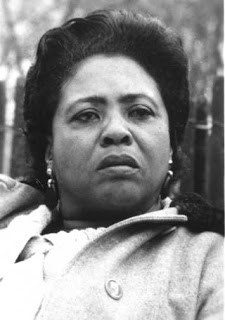By Tatiahna Turner

The youngest of 20 children, Fannie Lou Hamer was born Fannie Lou Townsend on October 6, 1917 in Montgomery County, Mississippi. From the age of 6 Fannie picked cotton with her family. She was allowed to attend the plantations’ one-room school house where she discovered her love for reading and poetry. However, at the age of 12 Fannie had to leave school to support her parents. She continued picking cotton and it said that at the age of 13 she could pick 200-300 pounds of cotton daily despite having a disfigured leg as a result of polio. She continued to develop her reading skills in Bible Study at her church, and in 1944, when her plantation owner found out that she was able to read and write, he selected her as the plantations’ time and record keeper. That same year, Fannie married a tractor driver on the plantation. Perry “Pap” Hamer and Fannie remained married for the next 18 years. Later, In 1961, while having surgery to remove a tumor Hamer was given a hysterectomy without consent by a white doctor. This was part of the state’s compulsory sterilization plan to reduce the number of poor blacks in the state and blacks in general. She is credited soon after for coining the phrase, “Mississippi appendectomy”.
Hamer became interested in the Civil Rights Movement during the 1950’s when she heard leaders in a local movement speak at the annual Regional Council of Negro Leadership. In 1962, Hamer learned about the right to vote from volunteers at a Student Nonviolent Coordinating Committee (SNCC) meeting. After this meeting, she began taking action in the civil rights movement. On August 31, Hamer traveled to Indianola, Mississippi to attempt to register to vote. She was not successful in this endeavor and when she returned home to the plantation she was fired by the plantation owner who had warned her against trying to register. Hamer’s husband was required to stay on the plantation until the end of the harvest season. On September 10, while staying with a friend, Hamer was shot at 16 times by the Ku Klux Klan. In fear of further retaliation, Hamer and her family moved to Tallahatchie County the next day where they stayed for three months. On December 4, Hamer returned to her hometown to take the literacy test but failed and was turned away. It is said that she told the registrar, “You’ll see me every 30 days till’ I pass.” Fannie said about the event, “I guess if I’d had any sense, I’d have been a little scared — but what was the point of being scared? The only thing they could do was kill me, and it kinda seemed like they’d been trying to do that a little bit at a time since I could remember.”
After being hired as a field secretary by the SNCC in 1963, Hamer attended a citizenship conference in Charleston, South Carolina. On the way, the party stopped in Winona, Mississippi where they were refused service inside of a local café. Shortly after, a highway patrol man came into the establishment with a bat and intimidated the activists to leave. As one of the members of the group was jotting down the license plate number of the officer’s car, a police chief entered and began arresting anyone that was with the party. Hamer and her colleagues were arrested and taken to a local jail where they were beaten and brutalized. Hamer was taken to a cell where the inmates were instructed to beat her with a baton. The police made sure that she was held down during this almost fatal attack. Hamer was released on June 12, 1963. It took her more than a month to recover, and she was still left with injuries. She sustained a blood clot over her left eye and permanent damage to one of her kidneys. When Fannie returned to Mississippi she organized a voter registration drive.
Hamer died of complications of hypertension and breast cancer on March 14, 1977. She was buried in Ruleville, Mississippi. Her tombstone was engraved with one of her famous quotes, “I am sick and tired of being sick and tired.”